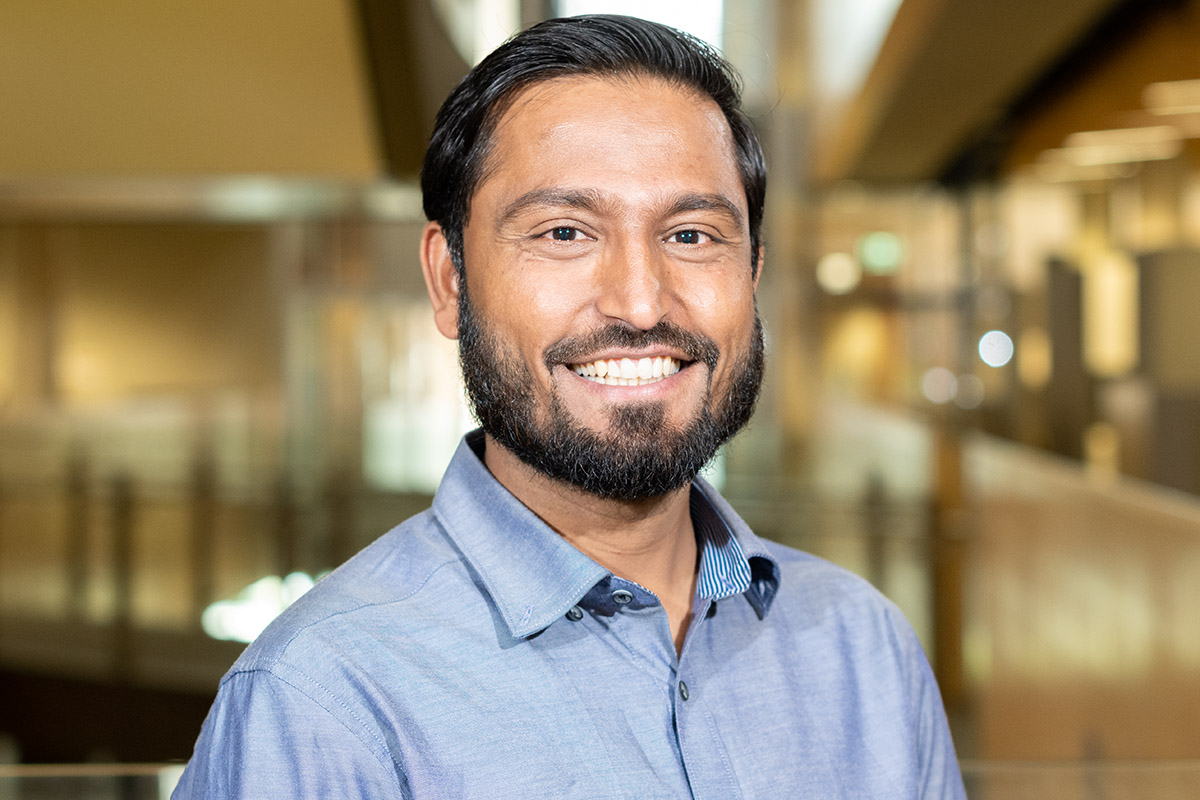
My Expertise
- Nanocrystals/Quantum Dots
- Solution processed thin films
- Inorganic thin film solar cells
- Solar-driven hydrogen generation
- Electrocatalysis
Keywords
Biography
Dr. Mahesh P. Suryawanshi is an ARC DECRA Fellow & Lecturer in the School of Photovoltaic and Renewable Energy Engineering (SPREE) at UNSW Sydney.
He graduated with a BSc (Physics) in 2008 from the Shivaji University, India, followed by an MSc in Physics (Energy Science) in 2010 where he was supervised by Prof. P. S. Patil, also at the Shivaji University, India. Always keen on contributing to the renewable energy field, he then joined for Ph....view more
Dr. Mahesh P. Suryawanshi is an ARC DECRA Fellow & Lecturer in the School of Photovoltaic and Renewable Energy Engineering (SPREE) at UNSW Sydney.
He graduated with a BSc (Physics) in 2008 from the Shivaji University, India, followed by an MSc in Physics (Energy Science) in 2010 where he was supervised by Prof. P. S. Patil, also at the Shivaji University, India. Always keen on contributing to the renewable energy field, he then joined for Ph. D. at Shivaji University in 2011 and moved to Chonnam National University, South Korea under 'Doctoral Exchange Program' from 2012 to 2015 to work on earth-abundant compounds for solar energy conversion applications under the supervision of Prof. Jin Hyeok Kim and Prof. A. V. Moholkar.
After graduating in 2015, he was then awarded by Brain Korea (BK) -21 Fellowship to continue his postdoctoral research work with Prof. Jin Hyeok Kim at Chonnam National University, South Korea. He started a solar fuels research subgroup with Prof. Kim to investigate earth-abundant photoelectrodes and catalysts for solar-driven hydrogen generation. In June 2019, he joined the SPREE, UNSW Sydney as a Postdoctoral Fellow to develop new PV materials as top cells for Si with Prof. Xiaojing Hao and Prof. Martin Green.
Starting January 2021, Mahesh took his ARC DECRA fellowship at SPREE, UNSW Sydney with a vision to establish Multifunctional NanoMaterials and Devices subgroup and foster international collaborations.
My Grants
2023-2026 - ARC DP (DP230101676), $326,000
2021-2024 - ARC DECRA Fellowship (DE210101565), $423,193
2019-2021 - Early Career Researcher Award (APOSTD/2019/078), European Commission, $190,000
2017-2019 - National Research Foundation (NRF), Korea (NRF2019M1A2A2936784), $156,000
2018-2019 - National Research Foundation (NRF), Korea (NRF2018H1D3A2002154, $76,000
My Qualifications
2011 - 2015 - Ph. D. in Physics (Materials Science), Shivaji University, India
2008 - 2010 - M.Sc. in Physics (Energy Science), Shivaji University, India
My Awards
2021-2023 - ARC DECRA Fellowship
2019-2021 - Early Career Researcher Award by Generalitat Valenciana, Spain & European Commission
2018 - Best Presentation Award, 7th Asia-Pacific Forum on Renewable Energy (AFORE) 2018, Korea
2016-2019 - Brain Korea (BK)-21 Postdoctoral Fellowship, South Korea
2015 - Key Scientific Article Award, Renewable Energy Global Innovations Series (REGI), Canada
2012-2015 - International Doctoral Exchange Student Scholarship, NRF, South Korea
2009 - Eklayva Scholarship, Shivaji University, India
My Research Activities
Dr. Mahesh's research interests include:
Nanocrystals/Quantum dots
- Design and developments of earth-abundant halide, chalcogenide, chalcohalide, phosphide and nitride nanocrystals/quantum dots
- Surface Ligand Engineering, shape, size and composition tuning, self-assembly
- Also interested in developing automated nanocrystal syntheses in gram scale
Energy Applications
- Solar-driven hydrogen generation using nanocrystals/quantum dots-based and direct ink processed thin films.
- Solution-processed inorganic thin film solar cells
- Quantum dots solar cells.
- Future Interest: Luminiscent solar concentrators (LSCs) and Light Emitting Diodes (LEDs) based on nanocrystals/quantum dots
Electrocatalysis
- Colloidal nanoelectrocatalysts
- Heterostructures carbon-based compounds
- Hydrogen evolution reaction, oxygen evolution reactions and alternative oxidation reactions, For e.g., Hydrazine, Methanol, Urea, Glycerol etc.
- In-Situ Operando characterizations of the electrocatalysts
My Research Supervision
Areas of supervision
There are currently one PhD scholarship and one Research Assistant (RA) position available for outstanding applicants to work on one of the following topics:
- Emerging halide, chalcohalide and chalcogenide nanocrystals for solar energy application
- Phosphide/Nitrides nanocrystals for hydrogen and oxygen evolution reactions and other alternative oxidation reactions
- New earth-abundant semiconductor nanocrystals for solar-driven hydrogen generation and CO2 reduction
Candidates will work with me and some other senior faculty members (co-supervisors) and will get sufficient training/mentoring in almost every aspects to become independent researcher.
Interested PhD applicants should reach to my email with the following documents:
- A letter highlighting your motivation for your application
- Full CV with transcripts (Undergraduate and Postgraduate), masters thesis work or publications
- UNSW HDR self-assessment results (https://selfassessment.research.unsw.edu.au/)
- English test results for International Applicants
Ph.D. Scholarship Opportunities
- Domestic Research Scholarship: https://research.unsw.edu.au/domestic-research-scholarships
- International Research Scholarship: https://research.unsw.edu.au/international-research-scholarships
- UNSW / Home Country Joint Scholarships: https://research.unsw.edu.au/unsw-home-country-joint-scholarships
To prospective PhD, Masters and undergraduate students, please directly contact m.suryawanshi@unsw.edu.au for more information.
Currently supervising
Xinyao Guo (HDR)
Yiming Xia (HDR)
Yangfan Zhang (HDR)
Hongrui Zhang (HDR)
Mani Mani (HDR)
Thalpavila Samarsinghe (HDR)
Muhammad Ibrar Ahmed (Research Assistant)
My Engagement
My Teaching
Location
Tyree Energy Technologies Building (TETB) H6, Level 2
UNSW Sydney,
NSW 2033 Australia